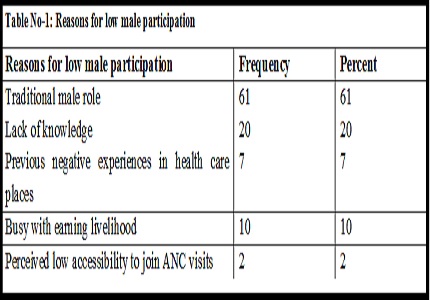Male involvement in antenatal and natal care practices of their partners – a community-based study in rural area of North Karnataka
Abstract
Introduction: Male involvement, an all-encompassing term which refers to the various ways in which men relate to reproductive health problems and programmes, reproductive rights and reproductive behaviour.
Objective: To assess the level of male involvement in the antenatal and natal care practices of women residing in Gadag.
Methodology: A cross sectional study conducted in rural areas of Gadag. 100 Male partners of parous women formed the study group. They were interviewed regarding the reproductive profile of their partners and their level of knowledge and involvement in the Antenatal and natal health care utilisation. Perceptions regarding male involvement in reproductive health were also assessed.
Results: 81% male partner accompanied their wives for at least one antenatal visit. Only 41% were aware of the complications which can occur during pregnancy, anemia being the most commonly known complication. 50% confessed that they could not spend quality time with their partners during pregnancy due to work and other restrictions. With reference to the autonomy regarding decision making about vital events, the participants were given freedom only about the age of their marriage. Other decisions regarding use of family planning, antenatal care, newborn care, immunisation of child was taken by the elders in the family. Traditional male roles were cited as the most common reason for low male participation.
Conclusion: In addition to the benefits for women and children, male involvement has potential benefits for men. Thus, programmes should be implemented based on the understanding of gender dynamics, on how decisions are made and implemented, on the changing needs of both genders and their interaction.
Downloads
References
2. Dudgeon MR, Inhorn MC. Men's influences on women's reproductive health: medical anthropological perspectives. DOI:10.1016/j.socscimed.2003.11.035.
3. Ashraf Ali, Kane Thomas, Shahriar Ahsan, Barkat-e-Khuda. Male Involvement in Reproductive Health Services in Bangladesh: A Review. ICDDR,B: Centre for Health and Population Research Mohakhali, Dhaka 1212, Bangladesh 1999 ICDDR,B .Special Publication No. 94.
4. Kumar Chiman Sinha. Male involvement and utilization of maternal health services in India. International Journal of Scientific and Research Publications, 2014(nov); Volume 4, Issue 11. ISSN 2250-3153 www.ijsrp.org
5. Chattopadhyay AMen in maternal care: evidence from India. J Biosoc Sci. 2012 Mar;44(2):129-53. doi: 10.1017/S0021932011000502. Epub 2011 Oct 18.
6. Yargawa J, Leonardi-Bee JMale involvement and maternal health outcomes: systematic review and meta-analysis. doi: 10.1136/jech-2014-204784. Epub 2015 Feb 19.
7. Redshaw M, Henderson J. Fathers' engagement in pregnancy and childbirth: evidence from a national survey. DOI: 10.1186/1471-2393-13-70. [PubMed]
8. Tweheyo R, Konde-Lule J, Tumwesigye NM, Sekandi JN. Male partner attendance of skilled antenatal care in peri-urban Gulu district, Northern Uganda. doi: 10.1186/1471-2393-10-53.
9. Hossain M , Ahmed K, Bulbul T, et al. Human rabies in rural Bangladesh. DOI:10.1017/S095026881100272X.
10. Ali M1, Rizwan H, Ushijima H.Men and reproductive health in rural Pakistan: the case for increased male participation. Eur J Contracept Reprod Health Care. 2004 Dec;9(4):260-6.
11. Kakaire O, Kaye DK, Osinde MO. Male involvement in birth preparedness and complication readiness for emergency obstetricreferrals in rural Uganda. DOI:10.1186/1742-4755-8-12. [PubMed]
12. Bhatta DN. Involvement of males in antenatal care, birth preparedness, exclusive breast feeding and immunizations for children in Kathmandu, Nepal. doi: 10.1186/1471-2393-13-14.
13. Shefner-Rogers CL, Sood S. Involving husbands in safe motherhood: effects of the SUAMI SIAGA campaign in Indonesia. J Health Commun2004;9:233–58. In: Davis J, Luchters S, Holmes W. Men and maternal and newborn health: Benefits, harms, challenges and potential strategies for engaging men. 2012.
14. Mangeni J.N, Mwangi A, Mbugua S, Muktar V. Male Involvement in Maternal Health Care as a Determinant of Utilization of Skilled Birth Attendants in Kenya. Demographic And Health Surveys. ICF International Calverton, Maryland, USA. 2013. No.93
15. Kululanga LI, Sundby J, Malata A, Chirwa E. Striving to promote male involvement in maternal health care in rural and urban settings in Malawi - a qualitative study. doi: 10.1186/1742-4755-8-36. [PubMed]
16. Mullany BC, Becker S, Hindin MJ. The impact of including husbands in antenatal health education services on maternal health practices in urban Nepal: results from a randomized controlled trial. DOI:10.1093/her/cyl060
17. Ampt F, Mon MM, Than KK, et al. Correlates of male involvement in maternal and newborn health: a cross-sectional study of men in a peri-urban region of Myanmar. doi: 10.1186/s12884-015-0561-9.

Copyright (c) 2018 Author (s). Published by Siddharth Health Research and Social Welfare Society

This work is licensed under a Creative Commons Attribution 4.0 International License.


 OAI - Open Archives Initiative
OAI - Open Archives Initiative


